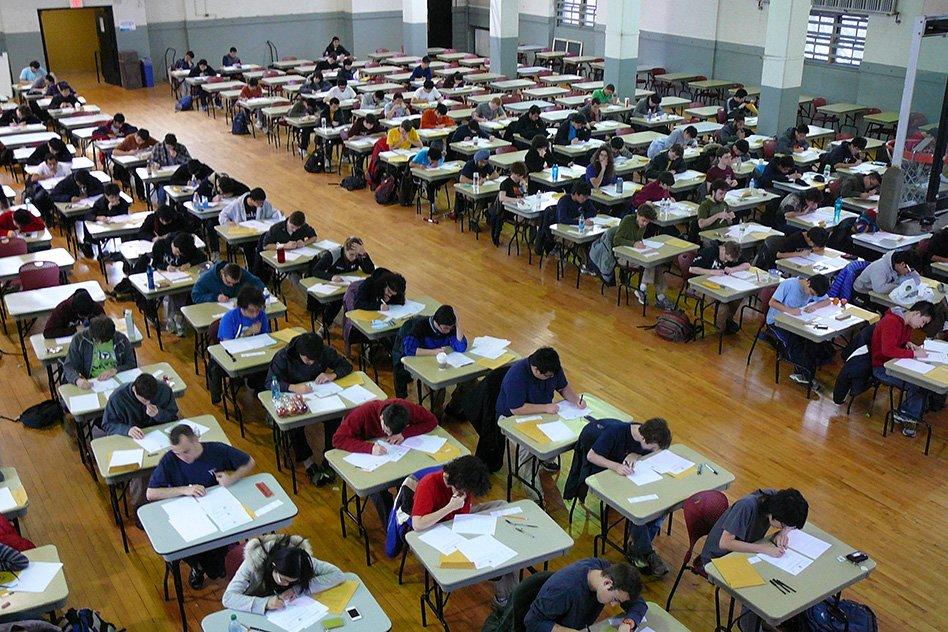For the second time in the history of the annual William Lowell Putnam Mathematical Competition, all five of the top spots in the contest, known as Putnam Fellows, came from a single school — MIT.
In its 82nd year, the Putnam Competition is the premier mathematical competition for undergraduate students in the United States and Canada, and is administered by the Mathematical Association of America (MAA). The grueling six-hour exam, which features 12 proof-based math problems, was taken by 2,975 undergraduates from 427 institutions on Dec. 4, 2021. Results were announced on Feb. 22.
Putnam Fellows, in alphabetical order, are seniors Andrew Gu and Michael Ren, sophomore Edward Wan, senior Shengtong Zhang, and junior Daniel G. Zhu. Each Putnam Fellow is awarded $2,500.
The 2021 Putnam team, listed in alphabetical order, are Wan, Zhang, and Zhu. Teams are based on the three top scorers from each institution. This is the MIT team’s sixth first-place win in the past eight competitions. This year, Princeton University came in second and Harvard University came in third. MIT is awarded $25,000 for being the top team, and each team member is awarded $1,000.
Zhang was also a Putnam Fellow in 2018 and 2019, and Zhu was also a 2019 Putnam Fellow. Both students made Putnam Fellow every year they participated in the competition. No official 2020 Putnam Competition was held due to the Covid-19 pandemic.
Junior Dain Kim, who finished in the top 15, received the Elizabeth Lowell Putnam Prize, which includes a $1,000 award. The fifth MIT student to receive this honor since the award began in 1992, Kim was also recognized by the Department of Mathematics as a top female scorer in the 2019 contest.
MIT students also dominated the rest of the scoreboard: nine of the next 10 (each awarded $1,000), nine of the next 12 (each awarded $250), and 40 of the 78 honorable mention rankings. Among the top 105 test-takers overall, 63 were MIT students.

“I congratulate all the students for their performance in the Putnam Competition. It’s an amazing accomplishment,” says Yufei Zhao, assistant professor of mathematics, who oversees the competition at MIT and also coaches first-year students for the competitions via class 18.A34 (Mathematical Problem Solving, Putnam Seminar). “We are very proud of the academic excellence of our students, and we celebrate the results of their hard work.” All five Putnam Fellows, as well as Kim, were former students in Zhao’s Putnam Seminar.
The Department of Mathematics’ PRIMES program, which attracts top high school students to its STEM classes, also counted many alumni among the top scorers, including Ren and Zhu, six of the next top 10, four out of the next 12 winners, and many honorable mentions. “I think about 45 percent of the top winners are PRIMES alumni,” says Pavel Etingof, a math professor who is also chief research advisor of the Department of Mathematics’ PRIMES high school math research program.
A full list of the rankings and names of the students can be found on the Putnam website.
In the history of the Putnam, only eight students achieved Putnam Fellow all four years, including three from MIT, and a Harvard student who is now a math professor at MIT, Bjorn Poonen. Current MIT math professors who were Putnam Fellows also include Davesh Maulik, Peter Shor, and David Vogan.
Only 23 other students in the contest's history are three-time Putnam Fellows; Zhang joins five other former MIT students, including Zhao ’10, PhD ’15, who earned this honor.
This year’s competition returned to its standard format after being curtailed by the pandemic; last year’s 81st Putnam was an online contest with no winners named. MIT’s 2019 top scorers made Putnam history when all five Putnam Fellows were from one institution.
This year, about 150 MIT students took the six-hour exam, which consists of 12 problems worth 10 points each. The top score this year was 119 out of 120 points. In comparison, the median score on the exam was four out of 120 points.
“The enthusiasm of the students, the commitment of the faculty advisors, and the efforts of all those involved demonstrate how much our community values this annual event,” says MAA Executive Director Michael Pearson.
Adds Putnam Director Dan Ullman, “I commend every student who attempted this collection of challenging problems, displaying and developing their creativity, power, and ingenuity through those efforts. These are the skills that will be necessary to solve the challenging problems that humankind faces today and will face in the future.”
The competition was founded in 1927 by Elizabeth Lowell Putnam in memory of her husband William Lowell Putnam, and has been offered annually since 1938, administered by the Mathematical Association of America.
